- Home
- Clive Barker
Shivers 7
Shivers 7 Read online
SHIVERS VII
edited by Richard Chizmar
CEMETERY DANCE PUBLICATIONS
Baltimore
2013
Shivers VII
Copyright © 2013 by Cemetery Dance Publications
FIRST DIGITAL EDITION
ISBN: 978-1-58767-225-5
Cemetery Dance Publications Digital Edition 2013
All rights reserved. No part of this book may be reproduced or transmitted in any form or by any means, electronic or mechanical, including photocopy, recording, or any information storage and retrieval system, without permission in writing from the story’s author, or his agent, except by a reviewer who may quote brief passages in a critical article or review.
All persons in this book are fictitious, and any resemblance that may seem to exist to actual persons living or dead is purely coincidental. This is a work of fiction.
Cover design by Gail Cross
Typesetting and book design by Robert Morrish
Cemetery Dance Publications
132-B Industry Lane, Unit 7
Forest Hill, MD 21050
Email: [email protected]
http://www.cemeterydance.com
“The Departed” © 1992 by Clive Barker. First appeared as “Hermione and the Moon” in The New York Times, 30th October 1992.
“Red Rover, Red Rover” © 2013 by Norman Partridge. First appeared in The Spook #2, August 2001.
“Breakbone” © 2013 by Bill Pronzini
“The Storybook Forest” © 2013 by Norman Prentiss
“Simple” © 2013 by Al Sarrantonio
“Born Dead” © 2013 by Lisa Tuttle
“The Baby Store” © 2010 by Ed Gorman. First appeared in Noir 13 (Perfect Crime Books, 2010).
“A Lonely Town in Alaska” © 2013 by Darren Speegle
“Zombie Dreams” © 2013 by Tim Waggoner
“Echoes” © 2013 by Don D’Ammassa
“Bone by Bone” © 2013 by Scott Nicholson
“Sleeping with the Bower Birds” © 2013 by Kaaron Warren
“Memory Lake” © 2002 by Robert Morrish. First appeared in Stones, edited by Brian Hopkins (Lone Wolf Publications, 2002).
“That Long Black Train” © 2013 by Travis Heermann
“Beholder” © 2013 by Graham Masterton
“Feel the Noise” © 2013 by Lisa Morton
“Plant Life” © 2013 by Greg F. Gifune
“I Am Become Poe” © 2013 by Kevin Quigley
“Arbeit Macht Frei” © 2013 by Del James
“Bovine” © 2013 by Joel Arnold
“Depth” © 2013 by Rio Youers
“GPS” © 2013 by Rick Hautala
“Room 8” © 2013 by Roberta Lannes
“Severance Package” © 2013 by Bev Vincent
“As She Lay There Dying” © 2013 by Brian James Freeman
“Weeds” © 1976 by Stephen King. First appeared in Cavalier magazine, May 1976
The Departed
Clive Barker
It was not only painters who were connoisseurs of light, Hermione had come to learn in the three days since her death; so too were those obliged to shun it. She was a member of that fretful clan now—a phantom in the world of flesh—and if she hoped to linger here for long she would have to avoid the sun’s gift as scrupulously as a celibate avoided sin, and for much the same reason. It tainted, corrupted, and finally drove the soul into the embrace of extinction.
She wasn’t so unhappy to be dead; life had been no bowl of cherries. She had failed at love, failed at marriage, failed at friendship, failed at motherhood. That last stung the sharpest. If she could have plunged back into life to change one thing she would have left the broken romances in pieces and gone to her six-year-old son Finn to say: trust your dreams, and take the world lightly, for it means nothing, even in the losing. She had shared these ruminations with one person only. His name was Rice; an ethereal nomad like herself who had died wasted and crazed from the plague but was now in death returned to corpulence and wit. Together they had spent that third day behind the blinds of his shunned apartment, listening to the babble of the street and exchanging tidbits. Towards evening, conversation turned to the subject of light.
“I don’t see why the sun hurts us and the moon doesn’t,” Hermione reasoned. “The moon’s reflected sunlight, isn’t it?”
“Don’t be so logical,” Rice replied, “or so damn serious.”
“And the stars are little suns. Why doesn’t starlight hurt us?”
“I never liked looking at the stars,” Rice replied. “They always made me feel lonely. Especially towards the end. I’d look up and see all that empty immensity and…” He caught himself in mid-sentence. “Damn you, woman, listen to me! We’re going to have to get out of here and party.”
She drifted to the window.
“Down there?” she said.
“Down there.”
“Will they see us?”
“Not if we go naked.”
She glanced round at him. He was starting to unbutton his shirt.
“I can see you perfectly well,” she told him.
“But you’re dead, darling. The living have a lot more trouble.” He tugged off his shirt and joined her at the window. “Shall we dare the dusk?” He asked her, and without waiting for a reply, raised the blind. There was just enough power in the light to give them both a pleasant buzz.
“I could get addicted to this,” Hermione said, taking off her dress and letting the remnants of the day graze her breasts and belly.
“Now you’re talking,” said Rice. “Shall we take the air?”
* * *
All Hallows’ Eve was a day away, a night away, and every shop along Main Street carried some sign of the season. A flight of paper witches here; a cardboard skeleton there.
“Contemptible,” Rice remarked as they passed a nest of rubber bats. “We should protest.”
“It’s just a little fun,” Hermione said.
“It’s our holiday, darling. The Feast of the Dead. I feel like…like Jesus at a Sunday sermon. How dare they simplify me this way?” He slammed his phantom fists against the glass. It shook, and the remote din of his blow reached the ears of a passing family, all of whom looked towards the rattling window, saw nothing, and—trusting their eyes—moved on down the street.
Hermione gazed after them.
“I want to go and see Finn,” she said.
“Not wise,” Rice replied.
“Screw wise,” she said. “I want to see him.”
Rice already knew better than to attempt persuasion, so up the hill they went, towards her sister Elaine’s house, where she assumed the boy had lodged since her passing.
“There’s something you should know,” Rice said as they climbed. “About being dead.”
“Go on.”
“It’s difficult to explain. But it’s no accident we feel safe under the moon. We’re like the moon. Reflecting the light of something living; something that loves us. Does that make any sense?”
“Not much.”
“Then it’s probably the truth.”
She stopped her ascent and turned to him. “Is this meant as a warning of some kind?” she asked.
“Would it matter if it were?”
“Not much.”
He grinned. “I was the same. A warning was always an invitation.”
“End of discussion?”
“End of discussion.”
* * *
There were lamps burning in every room of El
aine’s house, as if to keep the night and all it concealed at bay.
How sad, Hermione thought, to live in fear of shadows. But then didn’t the day now hold as many terrors for her as night did for Elaine? Finally, it seemed, after thirty-one years of troubled sisterhood, the mirrors they had always held up to each other—fogged until this moment—were clear. Regret touched her, that she had not better known this lonely woman whom she had so resented for her lack of empathy.
“Stay here,” she told Rice. “I want to see them on my own.”
Rice shook his head. “I’m not missing this,” he replied, and followed her up the path, then across the lawn towards the dining room window.
From inside came not two voices but three: a woman, a boy, and a man whose timbre was so recognizable it stopped Hermione in her invisible tracks.
“Thomas,” she said.
“Your ex?” Rice murmured.
She nodded. “I hadn’t expected…”
“You’d have preferred him not to come and mourn you?”
“That doesn’t sound like mourning to me,” she replied. Nor did it. The closer to the window they trod, the more merriment they heard. Thomas was cracking jokes, and Finn and Elaine were lapping up his performance.
“He’s such a clown!” Hermione said. “Just listen to him.”
They had reached the sill now, and peered in. It was worse than she’d expected. Thom had Finn on his knee, his arms wrapped around the child. He was whispering something in the boy’s ear, and as he did so a grin appeared on Finn’s face.
* * *
Hermione could not remember ever being seized by such contrary feelings. She was glad not to find her sweet Finn weeping—tears did not belong on that guileless face. But did he have to be quite so content; quite so forgetful of her passing? And as to Thom the clown, how could he so quickly have found his way back into his son’s affections, having been an absentee father for five years? What bribes had he used to win back Finn’s favor, master of empty promises that he was?
“Can we go trick-or-treating tomorrow night?” The boy was asking.
“Sure we can, partner,” Thomas replied. “We’ll get you a mask and a cape and—”
“You too,” Finn replied. “You have to come too.”
“Anything you want…”
“Son of a bitch,” Hermione said.
“…from now on…”
“He never even wrote to the boy while I was alive.”
“…anything you want.”
“Maybe he’s feeling guilty,” Rice suggested.
“Guilty?” She hissed, clawing at the glass, longing to have her fingers at Thomas’s lying throat. “He doesn’t know the meaning of the word.”
Her voice had risen in pitch and volume, and Elaine—who had always been so insensitive to nuance—seemed to hear its echo. She rose from the table, turning her troubled gaze towards the window.
“Come away,” Rice said, taking hold of Hermione’s arm. “Or this is going to end badly.”
“I don’t care,” she said.
Her sister was crossing to the window now, and Thomas was sliding Finn off his knee, rising as he did so, a question on his lips.
“There’s somebody…watching us,” Elaine murmured. There was fear in her voice.
Thomas came to her side; slipped his arm around her waist.
Hermione expelled what she thought was a shuddering sigh, but at the sound of it the window shattered, a hail of glass driving man, woman and child back from the sill.
“Away!” Rice demanded, and this time she conceded; went with him, across the lawn, out into the street, through the benighted town and finally home to the cold apartment where she could weep out the rage and frustration she felt.
* * *
Her tears had not dried by dawn; nor even by noon. She wept for too many reasons, and for nothing at all. For Finn, for Thomas, for the fear in her sister’s eyes; and for the terrible absence of sense in everything. At last, however, her unhappiness found a salve.
“I want to touch him one last time,” she told Rice.
“Finn?”
“Of course Finn.”
“You’ll scare the bejeezus out of him.”
“He’ll never know it’s me.”
She had a plan. If she was invisible when naked, then she would clothe every part of herself, and put on a mask, and find him in the streets, playing trick-or-treat. She would smooth his fine hair with her palm, or lay her fingers on his lips, then be gone, forever, out of the twin states of living death and Idaho.
“I’m warning you,” she told Rice, “you shouldn’t come.”
“Thanks for the invitation,” he replied a little ruefully. “I accept.”
His clothes had been boxed and awaited removal. They untaped the boxes, and dressed in motley. The cardboard they tore up and shaped into crude masks—horns for her, elfin ears for him. By the time they were ready for the streets All Hallows’ Eve had settled on the town.
It was Hermione who led the way back towards Elaine’s house, but she set a leisurely pace. Inevitable meetings did not have to be hurried to; and she was quite certain she would encounter Finn if she simply let instinct lead her.
There were children at every corner, dressed for the business of the night. Ghouls, zombies and fiends every one; freed to be cruel by mask and darkness, as she was freed to be loving, one last time, and then away.
“Here he comes,” she heard Rice say, but she’d already recognized Finn’s jaunty step.
“You distract Thom,” she told Rice.
“My pleasure,” came the reply, and the revenant was away from her side in an instant. Thom saw him coming, and sensed something awry. He reached to snatch hold of Finn, but Rice pitched himself against the solid body, his ether forceful enough to throw Thom to the ground.
He let out a ripe curse, and rising the next instant, snatched hold of his assailant. He might have landed a blow but that he caught sight of Hermione as she closed on Finn, and instead turned and snatched at her mask.
It came away in his hands, and the sight of her face drew from him a shout of horror. He retreated a step; then another.
“Jesus… Jesus…” he said.
* * *
She advanced upon him, Rice’s warning ringing in her head.
“What do you see?” she demanded.
By way of reply he heaved up his dinner in the gutter.
“He sees decay,” Rice said. “He sees rot.”
“Mom?”
She heard Finn’s voice behind her; felt his little hand tug at her sleeve. “Mom, is that you?”
Now it was she who let out a cry of distress; she who trembled.
“Mom?” he said again.
She wanted so much to turn; to touch his hair, his cheek; to kiss him goodbye. But Thom had seen rot in her. Perhaps the child would see the same, or worse.
“Turn round,” he begged.
“I…can’t…Finn.”
“Please.”
And before she could stop herself, she was turning, her hands dropping from her face.
The boy squinted. Then he smiled.
“You’re so bright,” he said.
“I am?”
She seemed to see her radiance in his eyes; touching his checks, his lips, his brow as lovingly as any hand. So this was what it felt like to be a moon, she thought; to reflect a living light. It was a fine condition.
“Finn…”
Thom was summoning the boy to his side.
“He’s frightened of you,” Finn explained.
“I know. I’d better go.”
The boy nodded gravely.
“Will you explain to him?” She asked Finn. “Tell him what you saw?”
Again, the boy nodded. “I won’t forget,” he said.
That was all she needed; more than all. She left him with his father, and Rice led her away, through darkened alleyways and empty parking lots to the edge of town. They discarded their costumes as they went. By
the time they reached the freeway, they were once more naked and invisible.
“Maybe we’ll wander awhile,” Rice suggested. “Go down south.”
“Sure,” she replied. “Why not?”
“Key West for Christmas. New Orleans for Mardi Gras. And maybe next year we’ll come back here. See how things are going.”
She shook her head. “Finn belongs to Thom now,” she said. “He belongs to life.”
“And who do we belong to?” Rice asked, a little sadly.
She looked up. “You know damn well,” she said, and pointed to the moon.
Red Rover, Red Rover
Norman Partridge
Everyone says the lake is haunted, but the boys have been looking all summer and they haven’t seen one ghost.
Until now.
Of course, it’s not a ghost in the conventional sense of the word, though the boys can’t understand that yet. Right now it’s just a man. The boys are in the cattails, trying to catch a couple frogs when they first notice him standing there with a canvas bag in one hand on a little scab of beach across the lake.
“Hey,” Jason says. “What do you suppose he’s got in the bag?”
“I don’t know,” Bill says.
“I know you don’t know, numbnuts. I just asked what you suppose he’s got.”
“Pipe down! The guy’s gonna hear you if you don’t. He’s probably some kind of nut, like that bum who hangs out in Miller’s Woods. He hears you, he’ll probably be over here in a minute shaking us down for pocket change.”
“He doesn’t look like a nut,” Jason says.
Bill snorts a laugh. “That’s what you think, genius.”
Both boys give the stranger the eye. They’re best friends. Jason’s the bigger of the two. He just turned eleven a couple days ago—August 1, 1969 to be exact—but he could pass for thirteen easy. Bill gave Jason a board game called Clue for his birthday. They’ve been playing it for a week, solving murder mysteries while the old black-and-white TV in Jason’s living room drones on in the background and Jason’s kid sister Molly begs them to play Candy Land with her. That’s a laugh. Bill and Jason don’t care anything about Candy Land. They ignore Molly completely. She says, “All you care about is Colonel Mustard in the library with the candlestick and Professor Plum in the kitchen with a rope. That’s a stupid game. Everybody just kills everybody else!”

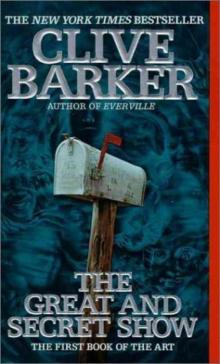 The Great and Secret Show
The Great and Secret Show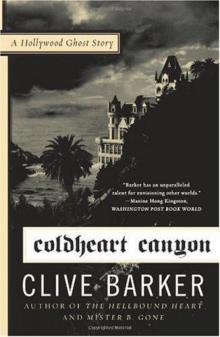 Coldheart Canyon: A Hollywood Ghost Story
Coldheart Canyon: A Hollywood Ghost Story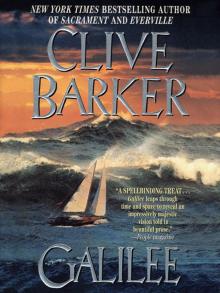 Galilee
Galilee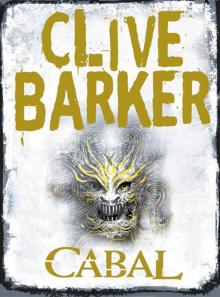 Cabal
Cabal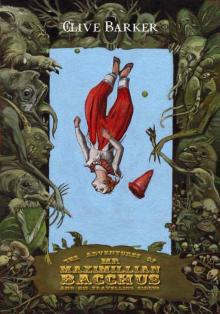 The Adventures of Mr. Maximillian Bacchus and His Travelling Circus
The Adventures of Mr. Maximillian Bacchus and His Travelling Circus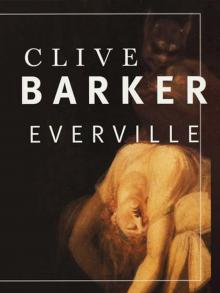 Everville
Everville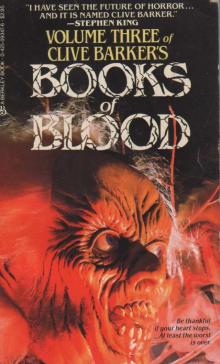 Books of Blood: Volume Three
Books of Blood: Volume Three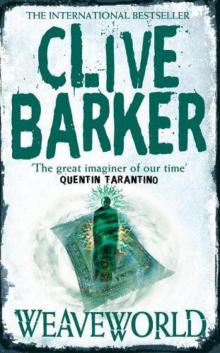 Weaveworld
Weaveworld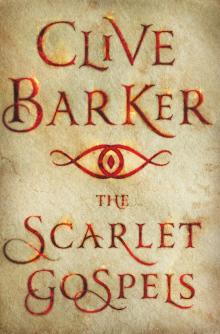 The Scarlet Gospels
The Scarlet Gospels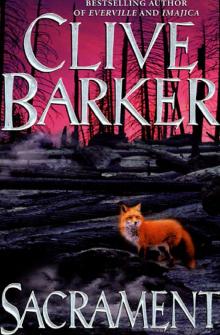 Sacrament
Sacrament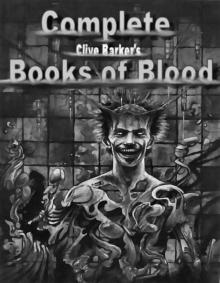 Books of Blood: Volumes 1-6
Books of Blood: Volumes 1-6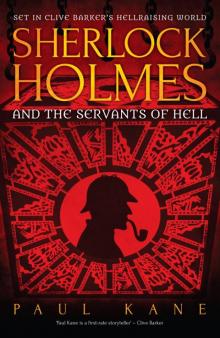 Sherlock Holmes and the Servants of Hell
Sherlock Holmes and the Servants of Hell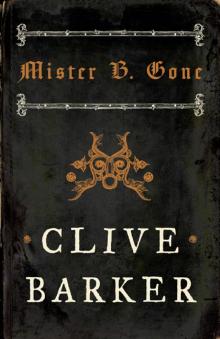 Mister B. Gone
Mister B. Gone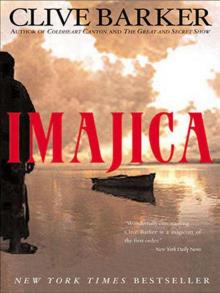 Imajica
Imajica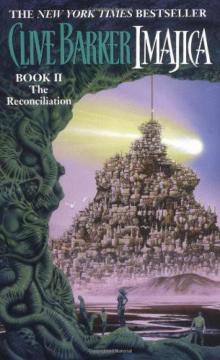 The Reconciliation
The Reconciliation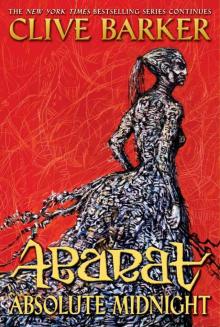 Abarat
Abarat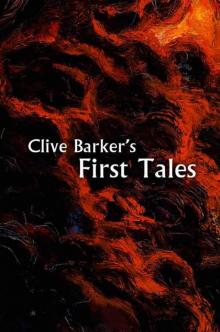 Clive Barker's First Tales
Clive Barker's First Tales The Hellbound Heart
The Hellbound Heart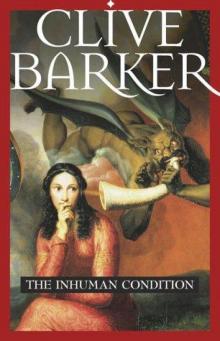 The Inhuman Condition
The Inhuman Condition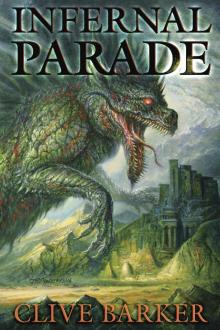 Infernal Parade
Infernal Parade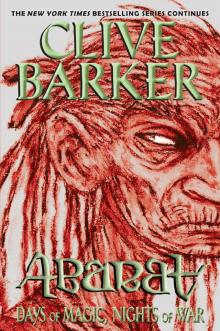 Days of Magic, Nights of War
Days of Magic, Nights of War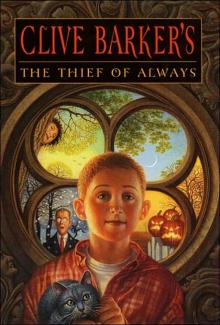 The Thief of Always
The Thief of Always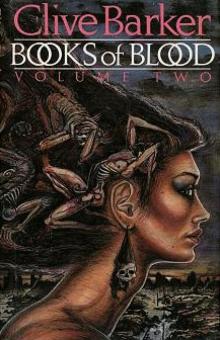 Books of Blood Vol 2
Books of Blood Vol 2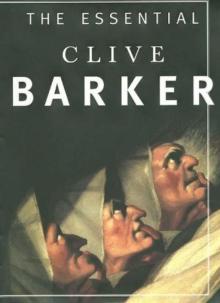 The Essential Clive Barker
The Essential Clive Barker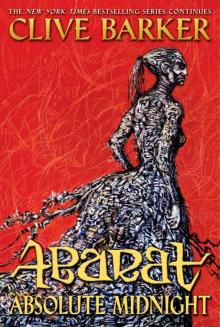 Abarat: Absolute Midnight a-3
Abarat: Absolute Midnight a-3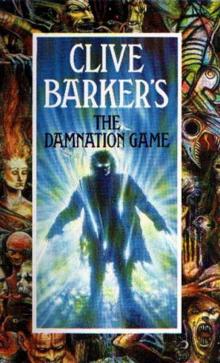 The Damnation Game
The Damnation Game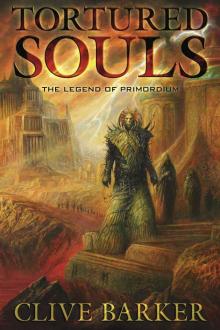 Tortured Souls: The Legend of Primordium
Tortured Souls: The Legend of Primordium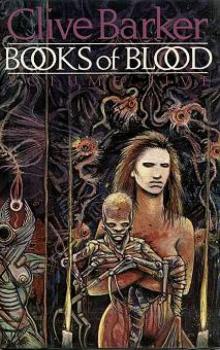 Books of Blood Vol 5
Books of Blood Vol 5 Imajica 02 - The Reconciliator
Imajica 02 - The Reconciliator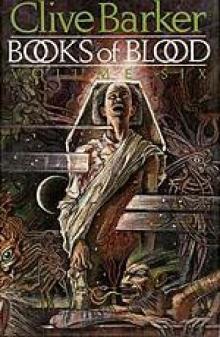 Books Of Blood Vol 6
Books Of Blood Vol 6 Imajica 01 - The Fifth Dominion
Imajica 01 - The Fifth Dominion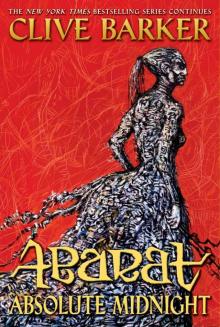 Abarat: Absolute Midnight
Abarat: Absolute Midnight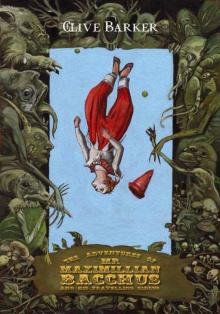 The Adventures of Mr. Maximillian Bacchus & His Traveling Circus
The Adventures of Mr. Maximillian Bacchus & His Traveling Circus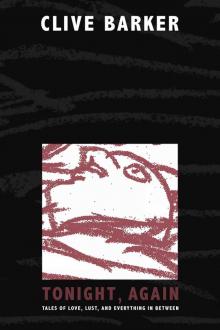 Tonight, Again
Tonight, Again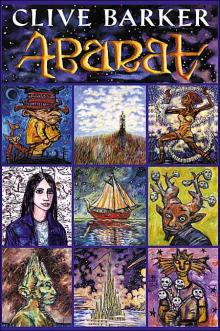 Abarat: The First Book of Hours a-1
Abarat: The First Book of Hours a-1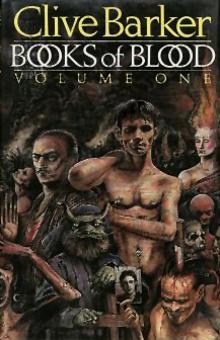 Books Of Blood Vol 1
Books Of Blood Vol 1 Age of Desire
Age of Desire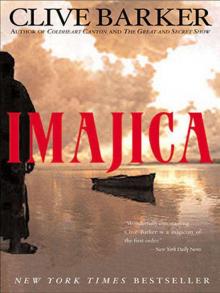 Imajica: Annotated Edition
Imajica: Annotated Edition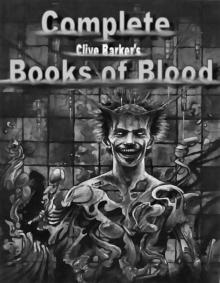 Complete Books of Blood
Complete Books of Blood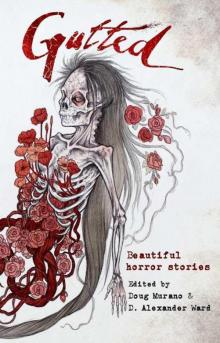 Gutted: Beautiful Horror Stories
Gutted: Beautiful Horror Stories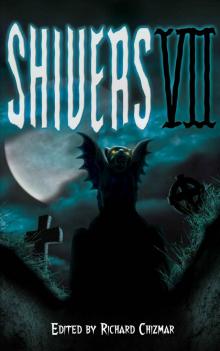 Shivers 7
Shivers 7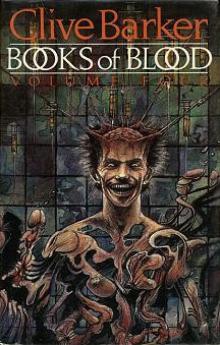 Books Of Blood Vol 4
Books Of Blood Vol 4